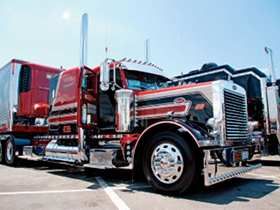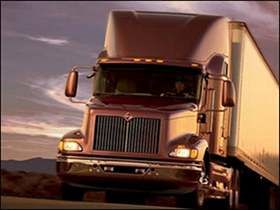Company Questions
Topic 26177 | Page 1
Check out the last page of my diary in the forum diary section. It'll give you a good idea of what day to day city driver life is like.
LTL is usually broken into 2 segments. Linehaul , such as myself, I take 2 trailers between terminals and meet points. The pay can be over 100k a year and home every night. The other is P&D which does local pick up and deliveries, pays hourly, home every night, and can pay 70-80k a year.
As far as a union it has its pluses and minuses. I personally am not a huge fan but that would be up to you if it is something you'd be interested in.
Thats the easy break down I could go into detail if you like.
Terminal:
A facility where trucking companies operate out of, or their "home base" if you will. A lot of major companies have multiple terminals around the country which usually consist of the main office building, a drop lot for trailers, and sometimes a repair shop and wash facilities.
LTL:
Less Than Truckload
Refers to carriers that make a lot of smaller pickups and deliveries for multiple customers as opposed to hauling one big load of freight for one customer. This type of hauling is normally done by companies with terminals scattered throughout the country where freight is sorted before being moved on to its destination.
LTL carriers include:
- FedEx Freight
- Con-way
- YRC Freight
- UPS
- Old Dominion
- Estes
- Yellow-Roadway
- ABF Freight
- R+L Carrier
P&D:
Pickup & Delivery
Local drivers that stay around their area, usually within 100 mile radius of a terminal, picking up and delivering loads.
LTL (Less Than Truckload) carriers for instance will have Linehaul drivers and P&D drivers. The P&D drivers will deliver loads locally from the terminal and pick up loads returning to the terminal. Linehaul drivers will then run truckloads from terminal to terminal.
Linehaul:
Linehaul drivers will normally run loads from terminal to terminal for LTL (Less than Truckload) companies.
LTL (Less Than Truckload) carriers will have Linehaul drivers and P&D drivers. The P&D drivers will deliver loads locally from the terminal and pick up loads returning them to the terminal. Linehaul drivers will then run truckloads from terminal to terminal.
I believe with YRC new drivers are on call, meaning you will be sitting and waiting until a load is assigned. If that’s the case you’ll have to decide if that’s something you’re comfortable with. One huge plus is I don’t think drivers pay anything for benefits.

I work for Estes express. it’s another LTL like bobcat bob said it’s pretty much the gist of it but the only thing is you have to start as an extra board in Estes and I’ve heard SAIA which is another LTL. Before your home every day they typically go by seniority. Whoever has the most time with them gets to choose their route/run and it goes down the list from there. They typically pay higher than OTR.
I drove for prime 2 years ago. I have been driving for 2 years one for prime OTR and one Estes. Some LTL companies do train but they go off the dockworkers so they have a list of sign-ups. They don’t do like Prime, Schnieder, etc where you talk to a recruiter and they just put you behind the wheel. For Estes, they either pick you from a sign-up list from their dock workers or you apply with experience.
Hello again all. I've spoken with US Xpress, Prime, and Schneider. I've received pre-employment letters from 2 of them. Recently, I saw a YRC truck over by my house. There are a truck stop and restaurants close to my house. I looked them up and I saw it was LTL and Union company How does that differ from companies like the mega carriers I named above if there is a big difference at all? Curious. Every day I learn something new researching the trucking industry.
LTL:
Less Than Truckload
Refers to carriers that make a lot of smaller pickups and deliveries for multiple customers as opposed to hauling one big load of freight for one customer. This type of hauling is normally done by companies with terminals scattered throughout the country where freight is sorted before being moved on to its destination.
LTL carriers include:
- FedEx Freight
- Con-way
- YRC Freight
- UPS
- Old Dominion
- Estes
- Yellow-Roadway
- ABF Freight
- R+L Carrier
OTR:
Over The Road
OTR driving normally means you'll be hauling freight to various customers throughout your company's hauling region. It often entails being gone from home for two to three weeks at a time.
OOS:
When a violation by either a driver or company is confirmed, an out-of-service order removes either the driver or the vehicle from the roadway until the violation is corrected.
Cecelia, both LTL work and OTR work with the major carriers pay an excellent wage. Because of the unions in the LTL industry, you do stand to make a little more over the long run with LTL companies, especially if you run linehaul , and you'll have a little bit better benefits. It's not a massive difference, and in fact, it isn't enough of a difference for that to be the deciding factor between the two. There's a much, much bigger difference that should be the deciding factor for you.
Working at an LTL company is what I refer to as the trucking equivalent of working on a production line. Whether you're a city driver that runs around your local area picking up and delivering freight all day, or you're a linehaul driver who runs back and forth between the same two points every day, the work is horrifically tedious. I think the only way trucking could be more boring is if you drove in circles around a parking lot.
However, the massive advantage of LTL work is that it's by far the best paying local job you'll ever find that will get you home every night without requiring you to load or unload the freight. The money is fantastic, you're home every night. It's just so boring you may want to kill yourself after a week of it.
OTR work pays fantastically well also, but every single day will be completely different from the last. You'll never know where you're going, you'll never know what lies around the next turn. You'll meet a ton of interesting people, see all sorts of new and interesting places, and your life will be far more of an adventure. Your schedule will constantly change from day to day, and so will pretty much everything else. It's a very dynamic environment.
In the end, you should let your personality and your life goals decide which is best for you. They're both fantastic options.
For me personally, I'm all about adventure. That's why I got started in trucking in the first place. I wanted to live on the road, see the whole country, and soak up all of the adventures that life on the road had to offer. Man, was it fantastic! It was exactly what I had hoped for. I loved it.
Now I've also had local jobs where you go between the same places every single day of your life, and for me it was grueling. By the end of the second week, I wanted to kill myself. I just can't live that way.
For others, a simple and predictable job that gets them home every night is a dream come true. I have a lot of family members, my dad included, who worked in the steel mills and auto plants for many, many years. Every single day of their lives was exactly the same. They worked the same job at the same place with the same people for decades. They absolutely loved it. They had nice homes they could afford and big families they could support. Adventure to them was a game of golf on a Saturday morning or a family picnic on a Holiday weekend.
So if you're the type that loves adventure, wants to see the country, loves to take on new and unexpected challenges, and wants every day be completely unique then you'll want to do OTR work.
If you'd rather have every day be the same, live in a very benign and predictable environment, and be home as often as possible then LTL is the way to go.
Both excellent choices with fantastic pay and benefits, but drastically different lifestyles.
LTL:
Less Than Truckload
Refers to carriers that make a lot of smaller pickups and deliveries for multiple customers as opposed to hauling one big load of freight for one customer. This type of hauling is normally done by companies with terminals scattered throughout the country where freight is sorted before being moved on to its destination.
LTL carriers include:
- FedEx Freight
- Con-way
- YRC Freight
- UPS
- Old Dominion
- Estes
- Yellow-Roadway
- ABF Freight
- R+L Carrier
OTR:
Over The Road
OTR driving normally means you'll be hauling freight to various customers throughout your company's hauling region. It often entails being gone from home for two to three weeks at a time.
Linehaul:
Linehaul drivers will normally run loads from terminal to terminal for LTL (Less than Truckload) companies.
LTL (Less Than Truckload) carriers will have Linehaul drivers and P&D drivers. The P&D drivers will deliver loads locally from the terminal and pick up loads returning them to the terminal. Linehaul drivers will then run truckloads from terminal to terminal.Brett sums it up pretty well. I'm doing LTL now because I can't be gone for weeks at a time. But I'd rather be outside than in a warehouse. That's why I plan on staying extra board as long as possible.
LTL:
Less Than Truckload
Refers to carriers that make a lot of smaller pickups and deliveries for multiple customers as opposed to hauling one big load of freight for one customer. This type of hauling is normally done by companies with terminals scattered throughout the country where freight is sorted before being moved on to its destination.
LTL carriers include:
- FedEx Freight
- Con-way
- YRC Freight
- UPS
- Old Dominion
- Estes
- Yellow-Roadway
- ABF Freight
- R+L Carrier
New Reply:
New! Check out our help videos for a better understanding of our forum features

















Preview:








 TT On Facebook
TT On Facebook
Hello again all. I've spoken with US Xpress, Prime, and Schneider. I've received pre employment letters from 2 of them. Recently, I saw a YRC truck over by my house. There is a truck stop and restaurants close to my house. I looked them up and I saw it was LTL and Union company How does that differ from companies like the mega carriers I named above if there is a big difference at all? Curious. Everyday I learn something new researching the trucking industry.
LTL:
Less Than Truckload
Refers to carriers that make a lot of smaller pickups and deliveries for multiple customers as opposed to hauling one big load of freight for one customer. This type of hauling is normally done by companies with terminals scattered throughout the country where freight is sorted before being moved on to its destination.
LTL carriers include: